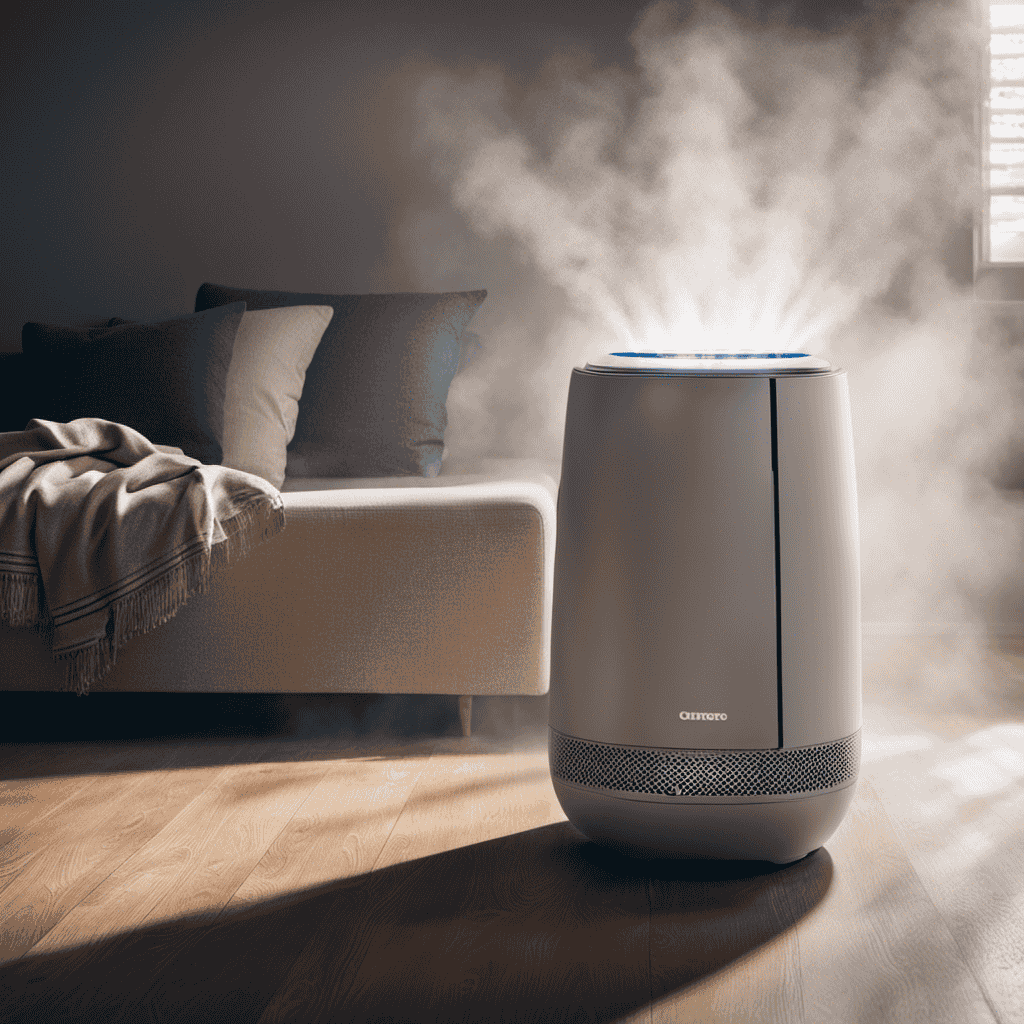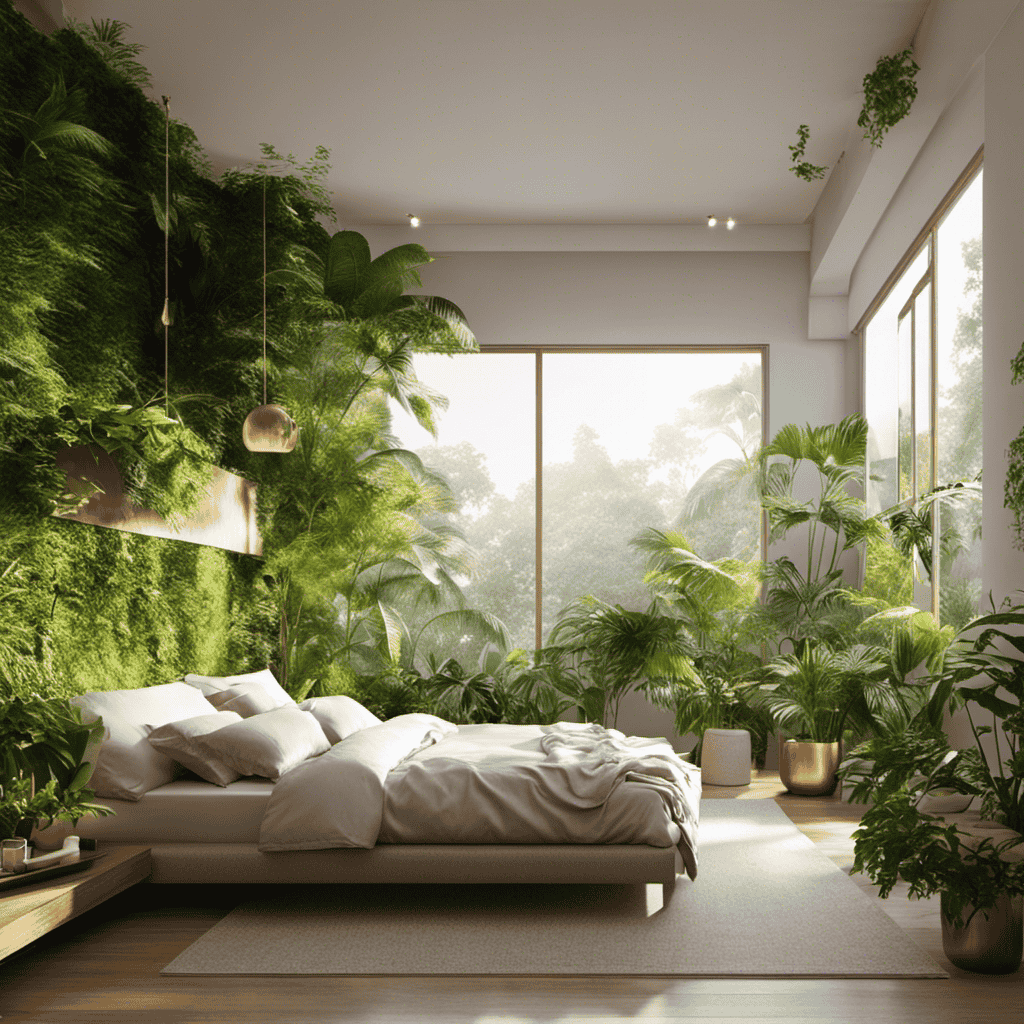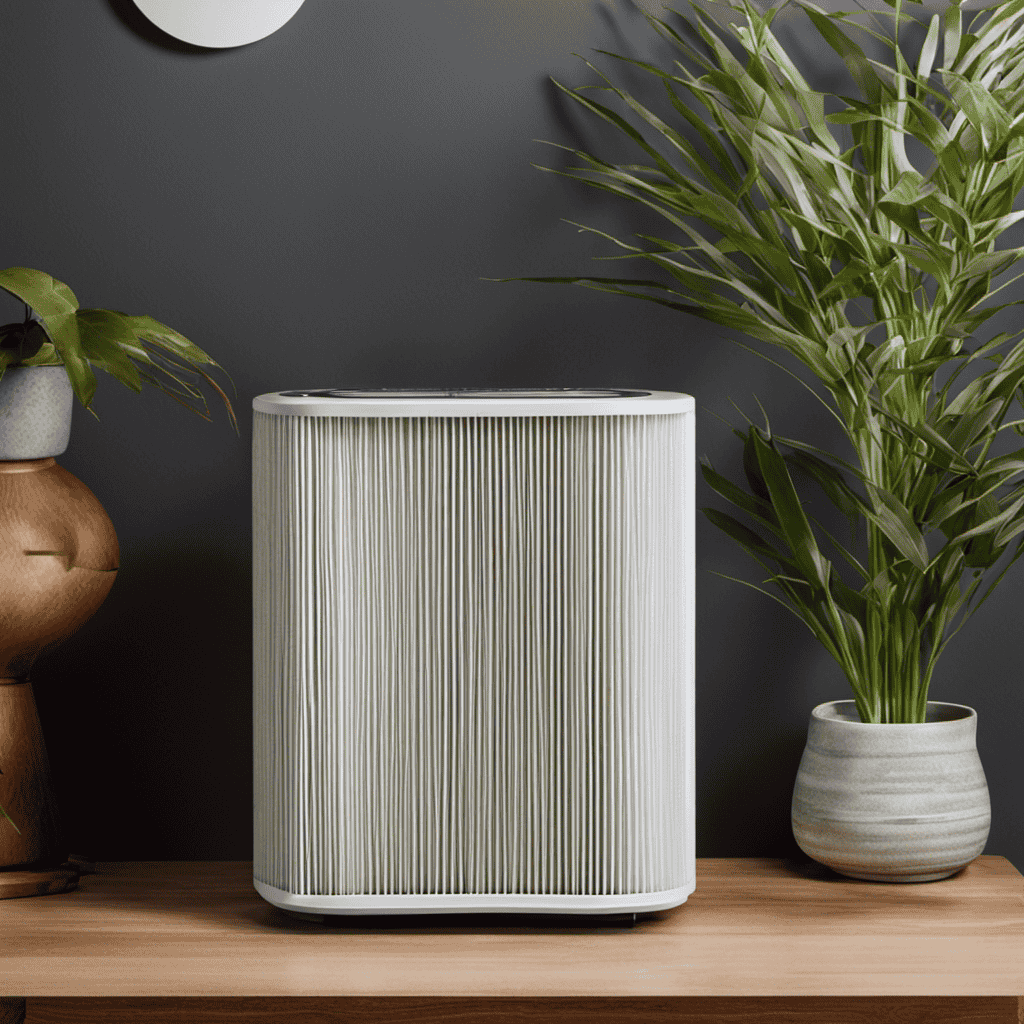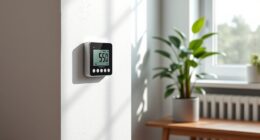As a physician, I constantly aim to maintain a healthy and sterile atmosphere, particularly within my workspace. This is why I have been contemplating the use of an air purifier.
In this article, I will explore the benefits, factors to consider, and potential risks of using an air purifier. Additionally, I will provide tips on how to choose the right one for your room and ensure its proper use and maintenance.
Let’s dive into the world of air purifiers and uncover the truth.
Key Takeaways
- Using an air purifier in the room can improve air quality and remove airborne pollutants like dust, pollen, pet dander, and mold spores.
- Air purifiers can alleviate symptoms of allergies and asthma, making it beneficial for individuals with these conditions.
- It is important to consider factors such as cost effectiveness, environmental implications, and specific room needs when deciding to use an air purifier.
- Proper use and maintenance of an air purifier, including regular filter cleaning or replacement, is essential for maintaining its effectiveness in capturing and removing particles from the air.
The Benefits of Using an Air Purifier in the Room
Using an air purifier in the room can greatly improve the air quality. The benefits of using an air purifier are numerous and well-documented.
Firstly, air purifiers effectively remove airborne pollutants such as dust, pollen, pet dander, and mold spores. This is particularly beneficial for individuals with allergies or asthma, as it can alleviate symptoms and provide relief.
Additionally, air purifiers can help eliminate unpleasant odors, such as smoke or cooking smells, leaving the room smelling fresh and clean.
Furthermore, air purifiers can remove harmful volatile organic compounds (VOCs) from the air, which are often found in cleaning products and can have detrimental effects on our health.
The effectiveness of air purifiers in improving indoor air quality is backed by scientific research and studies.
Transitioning into the subsequent section about factors to consider, it is important to understand how to choose the right air purifier that suits your specific needs and room size.
Factors to Consider Before Using an Air Purifier
Before you decide to use an air purifier, there are several factors to consider.
First and foremost, you should evaluate the cost effectiveness of using an air purifier in the room. This includes not only the initial purchase price, but also the ongoing maintenance and replacement of filters. Additionally, you should take into account the energy consumption of the air purifier and its impact on your electricity bill.
Secondly, it is important to consider the environmental implications of using an air purifier. While these devices can effectively remove pollutants from the air, they also contribute to energy consumption and waste generation. Consider the carbon footprint associated with manufacturing and disposing of the filters, as well as the energy consumption of the air purifier itself.
Lastly, think about the specific needs of the room. Consider the size of the room and the air purifier’s coverage area, as well as any specific pollutants or allergens present. Some air purifiers are more effective at removing certain types of pollutants than others, so it’s important to choose the right one for your specific needs.
Potential Risks and Side Effects of Using an Air Purifier
One potential risk of using an air purifier is that it may exacerbate respiratory conditions for individuals with asthma or allergies.
While air purifiers are designed to remove pollutants and allergens from the air, they can sometimes release harmful byproducts like ozone or chemicals from the filters themselves. These byproducts can irritate the airways and trigger symptoms in those with pre-existing respiratory conditions.
Additionally, if the air purifier is not properly maintained or if the filters are not replaced regularly, it can become a breeding ground for mold, bacteria, and other allergens, further worsening allergies.
It is important to consider these risks before using an air purifier, especially if you have asthma or allergies. However, there are ways to mitigate these risks and choose the right air purifier for your room.
How to Choose the Right Air Purifier for Your Room
When selecting an air purifier, it’s important to consider the size of your room and the specific pollutants you want to target. Here are some key factors to keep in mind:
-
Room size: Make sure to choose an air purifier that is suitable for the size of your room. Different models have different coverage areas, so it’s crucial to find one that can effectively clean the air in your space.
-
Pollutant filtration: Identify the specific pollutants you want to eliminate from your indoor air. Whether it’s dust, pollen, pet dander, or odors, different air purifiers come with various filtration technologies that can effectively remove these particles.
-
Cost-effective options: Consider the price range of different air purifier brands and models. Look for options that offer a good balance between cost and performance, ensuring that you get the best value for your money.
Taking these factors into account will help you select the right air purifier that meets your room’s needs and provides you with clean and fresh indoor air.
Tips for Proper Use and Maintenance of an Air Purifier
To prolong the lifespan of your air purifier, it’s essential to regularly clean or replace the filters according to the manufacturer’s recommendations.
Cleaning filters is a crucial step in maintaining the effectiveness of your air purifier. Over time, filters can become clogged with dust, allergens, and other common air pollutants. Regular cleaning or replacement ensures that your air purifier continues to effectively capture and remove these particles from the air.
When cleaning the filters, it’s important to follow the manufacturer’s instructions to avoid damaging the filter material. Some filters can be rinsed with water, while others may require vacuuming or replacement.
Frequently Asked Questions
Can an Air Purifier Remove All Types of Airborne Pollutants From the Room?
Yes, an air purifier can remove a wide range of airborne pollutants from the room, including dust, pollen, pet dander, and mold spores. However, the effectiveness may vary depending on the type of air purifier and the specific pollutant.
Will Using an Air Purifier in the Room Help Alleviate Allergies and Respiratory Issues?
Using an air purifier in the room can help alleviate allergies and respiratory issues. It is important to choose an effective air purifier that can effectively reduce indoor air pollution and is specifically designed for allergy relief.
How Often Should I Replace the Filters in an Air Purifier?
Replacing filters in an air purifier is crucial for maintaining its effectiveness. Regularly replacing filters not only ensures clean air but also extends the filter lifespan, allowing it to efficiently capture pollutants and allergens.
Can an Air Purifier Eliminate Odors in the Room?
Yes, you should use an air purifier when in the room. It helps eliminate odors, improve air quality, and reduce allergens. Regular maintenance ensures optimal performance and maximizes the benefits in small spaces.
Is It Safe to Use an Air Purifier in a Room With Pets?
It is generally safe to use an air purifier in a room with pets. However, it is important to consider the effectiveness of the air purifier and maintenance requirements to ensure optimal air quality.
Conclusion
After careful consideration and research, I’ve concluded that using an air purifier in the room can provide numerous benefits.
However, it’s crucial to consider several factors before making a decision. These include the specific needs of your room and potential risks involved.
Choosing the right air purifier and properly using and maintaining it can greatly enhance the air quality in your room.
So, stay tuned for the next article. I’ll delve deeper into these aspects and provide valuable insights on this topic.










